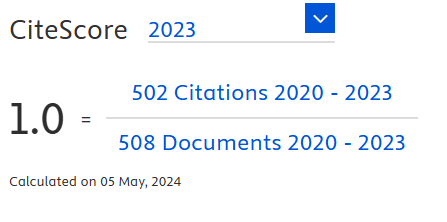Correlation Analysis between Internet Addiction and Self-Regulation among Thai University Students
DOI:
https://doi.org/10.18006/2022.10(4).846.851Keywords:
Internet usage behaviour, Internet addiction, Self-regulation, University students, Mental healthAbstract
The self-regulation of internet activities is a challenge between technology and human interaction, particularly in adolescents. It is very important to study the relationship between self-regulation and internet addiction since humans have become closely connected to technology in recent decades. The objective of the present research was to study the relationship between internet addiction and self-regulation by assessing the habits of university students. The samples consisted of 500 first-year students residing in Chiang Mai University dormitories, and data were collected from questionnaires regarding personal information, the Internet Addiction Test (IAT), and self-regulation assessment. Pearson’s correlation coefficient was used to investigate the relationship between internet addiction and self-regulation. The results of the study revealed that the level of internet addiction had a moderately positive relation with poor self-regulation, which had a correlation coefficient of 0.560 with a statistical significance level of 0.01. Further, the level of internet addiction had a low negative relation with good self-regulation, which had a correlation coefficient equal to -0.262 with a statistical significance level of 0.01. Hence, creating the necessary assistance and solutions is required to achieve a healthy balance in the behavior of young individuals.
References
Abaoğlu, H., Cesim, Ö. B., Kars, S., & Çelik, Z. (2017). Life Skills in Occupational Therapy. In M. Huri (Ed.), Occupational Therapy - Occupation Focused Holistic Practice in Rehabilitation. IntechOpen. https://doi.org/10.5772/intechopen.68462 DOI: https://doi.org/10.5772/intechopen.68462
Błachnio, A., & Przepiorka A. (2016). Dysfunction of Self-Regulation and Self-Control in Facebook Addiction. The Psychiatric quarterly, 87(3), 493-500. DOI: https://doi.org/10.1007/s11126-015-9403-1
Cahill, S.M., & Beisbier, S. (2020). Occupational Therapy Practice Guidelines for Children and Youth Ages 5-21 Years. American Journal of Occupational Therapy, 74(4), 1-48. DOI: https://doi.org/10.5014/ajot.2020.744001
Caplan, S.E. (2002). Problematic Internet use and psychosocial well-being: Development of a theory-based cognitive-behavioral measurement instrument. Computers in Human Behavior, 18 (5), 553-575. DOI: https://doi.org/10.1016/S0747-5632(02)00004-3
Charles, C. (2005). Occupational Therapy: performance, participation, and well-being (3rd ed.). Thorofare, NJ: SLACK Incorporated.
Charoenwanit, S. (2014). Game Addiction Behaviors: Impacts and Preventions. Thai Science and Technology Journal, 22(6), 871-879.
Chupradit, S., Joompathong, N., & Chupradit, P.W. (2020a). Prevalence and Correlates between Internet Use Behavior and Social Skill among University Students in Thailand. International Journal of Psychosocial Rehabilitation, 24(6), 14682-14695.
Chupradit, S., Kaewmamuang, N., Kienngam, N., & Chupradit, P.W. (2019) Prevalence and Correlates between Game Addiction and Stress of Adolescents in Chiang Mai, Thailand. Indian Journal of Public Health Research and Development, 10(8),1091–1096. DOI: https://doi.org/10.5958/0976-5506.2019.02042.4
Chupradit, S., Leewattana, A., & Chupradit, P.W.(2020b). The correlation analysis of internet usage and depression among undergraduate university students in Thailand: Cross-sectional study. Journal of Advanced Research in Dynamical and Control Systems, 12(6), 825-837.
Internet Addiction Test (IAT). (1998). Retrieved fromhttp://netaddiction.com/internet-addiction-test/.
Jelenchick, L.A., Hawk, S.T.,& Moreno, M.A.(2016). Problematic internet use and social networking site use among Dutch adolescents. International journal of adolescent medicine and health, 28(1), 119-21. DOI: https://doi.org/10.1515/ijamh-2014-0068
Ju, Y.A. (2007). School-based programs for Internet addiction prevention and intervention. International Symposium on the Counseling and Treatment of Youth Internet Addiction; Seoul, Korea: National Youth Commission.
Kuss, D. J., & Griffiths, M.D. (2017). Social Networking Sites and Addiction: Ten Lessons Learned. International journal of environmental research and public health, 14(3), 1-17. DOI: https://doi.org/10.3390/ijerph14030311
Lam, L.T. (2014). Internet gaming addiction, problematic use of the internet, and sleep problems: a systematic review. Current psychiatry reports, 16(4), 444. DOI: https://doi.org/10.1007/s11920-014-0444-1
Leménager, T., Hoffmann, S., Dieter J., Reinhard, I., et al. (2018). The links between healthy, problematic, and addicted Internet use regarding comorbidities and self-concept-related characteristics. Journal of behavioral addictions, 7(1), 31-43. DOI: https://doi.org/10.1556/2006.7.2018.13
Lemmens, J.S., & Hendriks, S.J. (2016). Addictive Online Games: Examining the Relationship Between Game Genres and Internet Gaming Disorder. Cyberpsychology, behavior and social networking, 19(4), 270-276. DOI: https://doi.org/10.1089/cyber.2015.0415
Li, S., Ren, P., Chiu, M. M., Wang, C., & Lei, H. (2021). The Relationship Between Self-Control and Internet Addiction Among Students: A Meta-Analysis. Frontiers in Psychology, 12, 1-16. DOI: https://doi.org/10.3389/fpsyg.2021.735755
Prasertsin, A. (2009). Effects of the Internet on Physical and Mental Health of Thai Children and Youth: Case Study in Bangkok. National Research Council of Thailand.
Srikan, S. (2009). Effects of using self-directed programs on academic responsibilities of students in grade 6, Phon Prachanukul Municipality School, Phon District, Khon Kaen Province. Bangkok: Srinakharinwirot University.
Starcevic, V., & Aboujaoude, E. (2017). Internet addiction: reappraisal of an increasingly inadequate concept. CNS spectrums, 22(1), 7-13. DOI: https://doi.org/10.1017/S1092852915000863
Student Dormitory Office CMU. (2018). Student Dormitory Office, Chiang Mai University.
Taweerat, P. (2000). Research Methods in Behavioral Sciences and Social Sciences. 8th ed. Chulalongkorn University Press, Bangkok.
Vadivu, S.V., & Chupradit, S. (2020). Psychosocial and Occupational Impact Assessment due to Internet Addiction: A Critical Review. Systematic Reviews in Phamacy, 11(7), 152-155.
Wattananonsakul, S. (2009). A development of the causal models of adolescent smoking/drinking behaviors and a study of model invariance across age. Unpublished PhD thesis submitted to the Chulalongkorn University, Bankok.
Young, K.S. (1996). Internet Addiction: The Emergence of a New Clinical Disorder. Cyber Psychology & Behavior, 1, 237-244.
Young, K.S. (1999). Internet addiction: Symptoms, evaluation, and treatment innovations in clinical practice FL: Professional Resource Press. DOI: https://doi.org/10.1136/sbmj.9910351
Young, K.S.(1998). Internet addiction: The emergence of a new clinical disorder. Cyber Psychology & Behavior, 1(3), 237-244. DOI: https://doi.org/10.1089/cpb.1998.1.237
Downloads
Published
How to Cite
License

This work is licensed under a Creative Commons Attribution-NonCommercial 4.0 International License.












